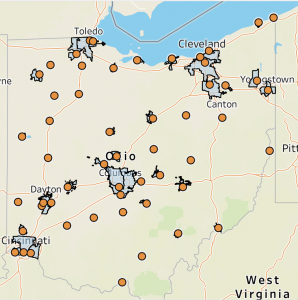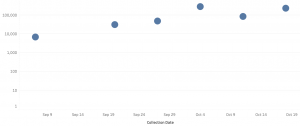News
Sewage Offers Clues To Combating Coronavirus Spread
By: David Forster
Posted on:
ATHENS, Ohio (WOUB) — The city of Athens learned this week that the presence of the coronavirus in its wastewater is up 10-fold since testing began early in September.
The viral load in wastewater is seen as predictive, meaning that when the number goes up there could be more COVID-19 cases on the way.
Think of it as an early warning system.
Rebecca Fugitt, who oversees the state’s wastewater sampling program, said that research into the coronavirus has found that when people get infected, they almost immediately begin shedding genetic copies of the virus into their feces. So these genetic markers can show up in wastewater well before the infections lead to full-blown cases.
“That’s why it’s helpful to be a leading indicator because you can usually pick this up about three to seven days before you see the increase in cases,” she said.

This allows the state to give local health officials a heads up so they can take steps to try to contain the spread of the coming outbreak by warning people that it’s coming and encourage them to take precautions.
“Even though everybody’s really weary of being reminded of what they need to do, hopefully they’ll say yeah, we really need to take note and we need to avoid the crowds and not have family gatherings,” Fugitt said.
The wastewater sampling provides much more advance notice of a possible outbreak or hotspot than testing people with symptoms because by then they’ve already been infected and contagious for days or even more than a week.
But what the viral load data doesn’t reveal right now is where in a community those new COVID-19 cases might show up.
Sampling is being done in about 50 or so communities around the state so far, and Fugitt said the priority right now is to add more communities to the program. The state only has enough funding to draw samples from one location in each community, and that’s at the point where the sewer lines all feed into the wastewater treatment plant.
These samples provide a big-picture overview of the viral load for the entire community.
“So it’s kind of hard to piece out exactly where or when the spike may or may not occur,” said Jack Pepper, administrator of the Athens City-County Health Department. “But it does allow for the state to direct resources to areas that they feel like there may be a spike coming.”
Pepper said he’s already making arrangements with the state for popup testing sites in Athens County to get a better idea of how many people in the community may be infected.
Athens Mayor Steve Patterson said he contacted Fugitt this week to see if samples could be drawn from several locations within the city. This would make it easier to determine where in the city a new COVID-19 flareup may occur.
“If we’re able to pinpoint certain communities within the greater Athens community, that could be extraordinarily helpful in letting us know where we need to focus our energy,” Pepper said.

Fugitt said the city is welcome to add more locations, but it would have to cover the cost for the additional sampling and testing. The city could then feed the data to the state for analysis.
Meanwhile, the state has agreed to provide funding to Ohio University so that it can sample wastewater from five different locations on campus during the spring semester, Fugitt said.
This is a priority because most of the COVID-19 cases in Athens so far have been linked to the student population, and the university is welcoming back all students who want to return in the spring.
Fugitt said that multiple sampling sites might allow the university to narrow down a viral load spike to perhaps one or two residence halls and give the campus time to try to get ahead of what’s coming.
“Either they’re going to amp up testing, they’re going to amp up outreach, whatever they’re going to do to help prevent an outbreak in those dorms.”
Funding for the wastewater testing program came through the massive coronavirus relief package passed by Congress in late March. The program has enough money to carry it through the end of the year.
Another round of coronavirus aid has been stalled in Congress for months now due to political gridlock, but Fugitt remains hopeful it will eventually get passed and lead to more funding to keep the program going.

